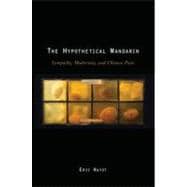
The Hypothetical Mandarin Sympathy, Modernity, and Chinese Pain
by Hayot, EricBuy New
Rent Textbook
Rent Digital
Used Textbook
We're Sorry
Sold Out
How Marketplace Works:
- This item is offered by an independent seller and not shipped from our warehouse
- Item details like edition and cover design may differ from our description; see seller's comments before ordering.
- Sellers much confirm and ship within two business days; otherwise, the order will be cancelled and refunded.
- Marketplace purchases cannot be returned to eCampus.com. Contact the seller directly for inquiries; if no response within two days, contact customer service.
- Additional shipping costs apply to Marketplace purchases. Review shipping costs at checkout.
Summary
Author Biography
Eric Hayot is Associate Professor of Comparative Literature and Director of the program in Asian Studies at the Pennsylvania State University.
Table of Contents
| Series Editors' Foreword | p. xi |
| Introduction: The Hypothetical Mandarin | p. 3 |
| Anecdotal Theory: Edmund Scott, Exact Discourse (1606); Stephen Greenblatt, Learning to Curse (1990) | p. 36 |
| The Compassion Trade: Punishment, Costume, Sympathy, 1800-1801 | p. 60 |
| The Chinese Body in Pain: American Missionary Medical Care, 1838-1852 | p. 95 |
| Chinese Bodies, Chinese Futures: The "Coolie" in Late Nineteenth-Century America | p. 135 |
| Bertrand Russell's Chinese Eyes; or, Modernism's Double Vision | p. 172 |
| Ideologies of the Anesthetic: Acupuncture, Photography, and the Material Image | p. 207 |
| Closures: Three Examples in Search of a Conclusion | p. 246 |
| Index | p. 273 |
| Table of Contents provided by Ingram. All Rights Reserved. |
An electronic version of this book is available through VitalSource.
This book is viewable on PC, Mac, iPhone, iPad, iPod Touch, and most smartphones.
By purchasing, you will be able to view this book online, as well as download it, for the chosen number of days.
Digital License
You are licensing a digital product for a set duration. Durations are set forth in the product description, with "Lifetime" typically meaning five (5) years of online access and permanent download to a supported device. All licenses are non-transferable.
More details can be found here.
A downloadable version of this book is available through the eCampus Reader or compatible Adobe readers.
Applications are available on iOS, Android, PC, Mac, and Windows Mobile platforms.
Please view the compatibility matrix prior to purchase.
